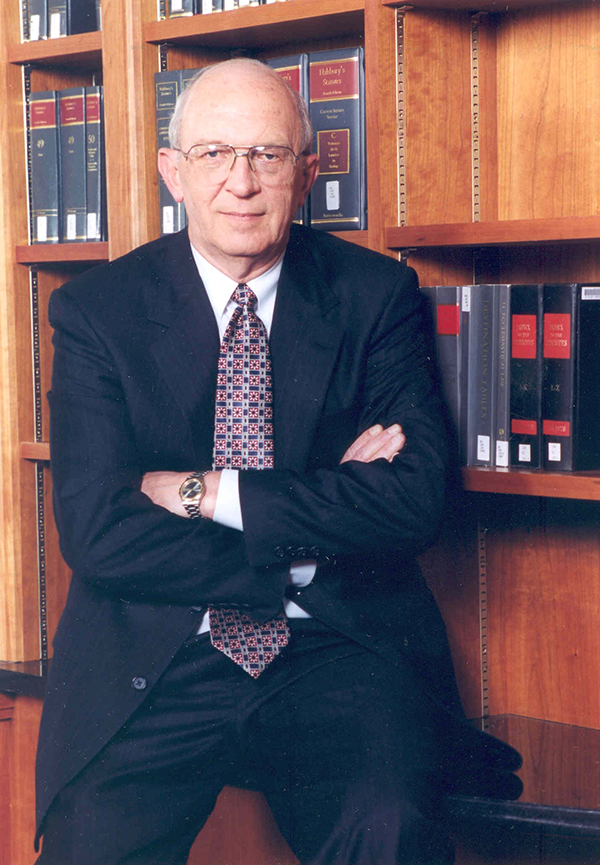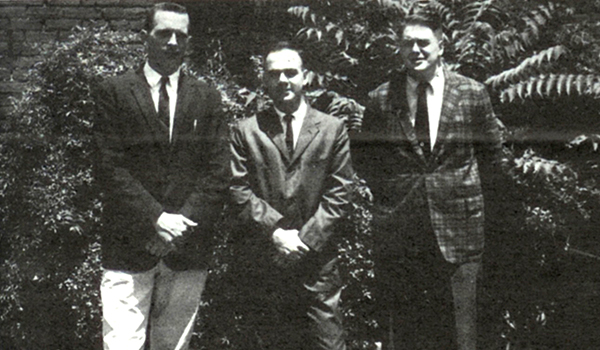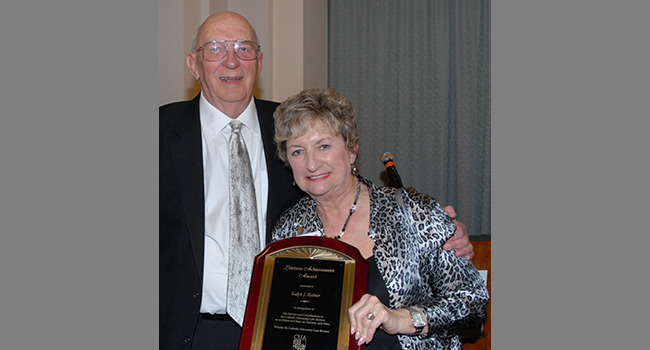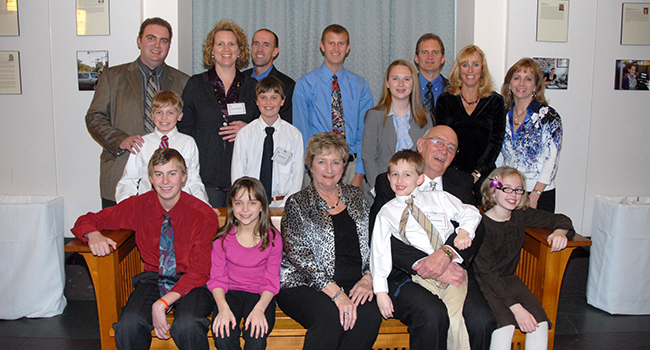On June 11, 2020, Professor Emeritus and former Dean Ralph J. Rohner '63 passed away. It is hard to capture in words what Ralph has meant to The Catholic University of America Columbus School of Law, but he made it obvious to all by the way he lived what the Law School meant to him and his family. He and his beloved wife Monica have been some of the greatest champions of our school in its history. Among other things, Ralph led the way to the construction of our beautiful building, mentored faculty and staff with wit and compassion, managed the law school with good humor and fairness, and connected with sincerity and ease with students and alums -- all while establishing himself as a respected academic scholar and teacher.
As we gather our community's memories for a proper tribute to Ralph, please find a notice of his passing in The Washington Post here, and our article below, reflecting an interview that was conducted in December of 2018 after Ralph had received the 2018 William Callyhan Robinson Award.
 Professor Emeritus Ralph J. Rohner ‘63
Professor Emeritus Ralph J. Rohner ‘63
Can you tell us a little bit about your background?
I’m a Catholic University lifer. I am a double cardinal — I attended undergrad (Class of 1960) and law school here. I have spent a lifetime on the Catholic University Campus.
In 1964 I began teaching commercial and consumer law courses at Catholic Law. I eventually served as dean from January 1987 through August 1995, where I oversaw the design and construction of the new law school building.
In 1975-76 I served as staff counsel to the Consumer Affairs Subcommittee of the U.S. Senate Banking Committee. I was a consultant to the Federal Reserve Board, the Federal Deposit Insurance Corporation, and various consumer banking trade associations and institutions, including more than 25 years as Special Counsel to the Consumer Bankers Association, Rosslyn, Virginia. From 1979 through 1981 I served as a member of the Federal Reserve Board’s Consumer Advisory Council, and in 1981 I chaired that council.
I am a co-author of a law school casebook on consumer law, and editor/co-author of a treatise on truth-in-lending law, and have written and lectured extensively on the federal and state consumer credit laws. I am also a member of the American Law Institute, of the American Bar Association Business Law Section and its Committees on the Uniform Commercial Code and on Consumer Financial Services, and am a founding member and past president of the American College of Consumer Financial Services Lawyers.
 1962 Sutherland Cup Competition Winners (L to R Ralph Rohner, Jean Provost, and James Cassidy)
1962 Sutherland Cup Competition Winners (L to R Ralph Rohner, Jean Provost, and James Cassidy)
Why did you decide to attend Catholic Law?
I have no idea. I had just finished up my undergraduate degree and was trying to decide what to do next. When I visited Catholic University before my undergrad degree, I fell in love with the campus. It really was a question on what was the next step in one’s career. Law school was a good stepping stone. A lot of scholarship money was given out in those days, and I knew many of the students from undergrad.
How did you know you wanted to continue pursue law?
I knew that I wanted to continue to pursue law after my time on moot court team. During the spring semester our team was declared the moot court competition winner. I thought, “Hey, I can do what these lawyers can do.” I wasn’t so apprehensive or fearful after that victory. One of things that law school provides for students is confidence. When the judge looked down on us and said “You are the victors in this competition,” we demonstrated our ability to manage this field.
Can you discuss your early career developments?
I began my career as a legal writing instructor at Stanford University in 1963. I then picked up an appointment in D.C. at a government agency. The Dean called me in October of 1963 asking if I would like to teach as a part-time, adjunct faculty member. This was my opportunity to see if teaching would be a realistic career. The current professor was transferred out of town, and I would need to start the following Friday night. I asked myself: “Do you, Rohner, have enough nerve to take on this course beginning Friday night?”
I was offered a faculty position teaching commercial transactions the following year, and this became my speciality field for the next 50 years, along with consumer law. My most monumental example of career trajectory was the shift from student to faculty member.
What were the most rewarding part of your job? What were the biggest challenges?
The most rewarding part of the job was walking into the classroom every day, and sensing the response of the students when they are really engaged, trying to stretch their ability to learn. Catholic Law is a teaching institution, and if you are not joyful to teach or engage the students, then you are in the wrong business. The day-to-day repetition of interaction with the students, is what it is all about.
The most rewarding part of being Dean was hiring and evaluating candidates. There would be a need to hire certain faculty in a specific area of life…. There is nothing quite like putting your sights on a faculty candidate and having them come spend their time at the law school. The faculty is the heart and soul of the law school, and this was a source of great satisfaction.
The most challenging parts of the job were looking for more resources and money. The law school building project was extraordinary. It was the most rewarding, but also the most challenging. No one is standing outside waiting to write you a check. You have to go out and get it. Getting to pull all the pieces together as best you could was the most rewarding part, and the challenges turned out okay.
 Ralph Rohner with Monica Rohner after receiving the Lifetime Achievement Award from the Catholic University Law Review
Ralph Rohner with Monica Rohner after receiving the Lifetime Achievement Award from the Catholic University Law Review
What advice would you give to young lawyers or law students who have similar legal aspirations?
Go for it! A law degree is extremely variable. It is not the case that lawyers only practice law in courts and courtroom with plaintiff and defendants. A law degree can be invaluable in business, education … the range of opportunities are enormous. I can’t tell you how many times I have had long conversations with graduates who are not doing conventional law practices. The opportunities for a person with a law degree are great.
Do you have a favorite memory from Catholic Law?
My favorite memory was when my moot court team was declared the winner. It struck me right there standing at the podium with the judges passing the award down to the street. That is probably my favorite memory. Not only could I survive this competition, I could survive the next two years, and challenges that could come my way.
How did you balance your work and personal life?
My wife, Monica, served as Director of Alumni Office in the Law School. This was an easy expansion of her activities and mine. It was extraordinarily helpful that she could take care of the alumni side during the law school building expansion. She was the director for 20 years. We wouldn’t have succeeded if she wasn’t there.
In earlier years, Monica stayed home when the children were young. There were challenges but not any problems. Through our shared efforts we raised four children, with two attending Catholic University for undergraduate education.
 Members of the Rohner family
Members of the Rohner family
